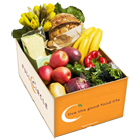You are currently browsing the tag archive for the ‘soaking oats’ tag.
Everyone is telling you that whole grains reign nutritionally supreme, but what they are not telling you is that it is easy for “whole grains” not to live up to the nutrient rich, good-for-you standards they are held to. As I explained on Monday, processed whole grains in packaged foods like cereal, cookies and crackers, are hardly better than their refined counterparts.

Unfortunately, there are some setbacks to natural whole grains that can inhibit the nutritional benefits if not properly prepared. Enzyme inhibitors and natural substances that the plants use to protect their seeds can almost completely prevent the digestion and absorption of whole grains. For this reason, it is absolutely necessary to soak all grains before cooking them.
Phosphorus in the bran of whole grains is tied up in a substance called phytic acid. Phytic acid combines with iron, calcium, magnesium,copper and zinc in the intestinal tract, blocking their absorption. Whole grains also contain enzyme inhibitors that can interfere with digestion. Traditional societies usually soak or ferment their grains before eating them, processes that neutralize phytates and enzyme inhibitors and in effect, predigest grains so that all their nutrients are more available. Sprouting, overnight soaking, and old-fashioned sour leavening can accomplish this important pre-digestive process in our own kitchens. Many people who are allergic to grains will tolerate them well when they are prepared according to these procedures. – Nourishing Traditions, Sally Fallon
Soaking grains will help those who have digestion troubles by easing the labor of grain breakdown and absorption. For every grain eater, soaking will benefit your body by providing more accessible and digestible nourishment.
Soaking is an easy process that can be done several days beforehand. In a large, non-reactive bowl, soak your grains in water with 1-2 tablespoons of lemon juice, vinegar, keifer or buttermilk (to provide an acid that works to neutralize the nutrient blockers).

After 12 to 24 hours rinse your grains and prepare as instructed. For baking purposes it works well to soak your grains in the liquid (buttermilk, yogurt, milk or non dairy alternative) called for in the recipe. After soaking add the rest of your ingredients and prepare as instructed.
Here are two of my personal favorite soaked whole grain breakfast treats!
Creamy Morning Oats with Fresh Fruit
3/4 Cup Organic whole rolled oats
1 Cup Organic unsweetened plain keifer
1 tsp. Cinnamon
½ Cup fresh seasonal fruit of your choice (pears are a great pick in the winter and blueberries are my summer favorite)
Combine all ingredients except fruit in a medium sized ceramic or glass bowl. Cover and soak overnight at room temperature. In the morning add fresh fruit and enjoy!
Unbelievably Fluffy Whole Grain Waffles
2 Cups whole-wheat flour
1 ¼ Cup plain keifer or ¾ cup plain yogurt to ¾ cup milk
1 tbsp baking powder
1 tsp salt
3 tbsp sugar
4 eggs split into yolks and whites
½ cup vegetable oil
Combine flour and keifer or milk and yogurt in a medium sized mixing bowl. Cover and refrigerate overnight. Add baking powder, salt, sugar, egg yolks and vegetable oil to flour mixture and mix to incorporate. Beat egg whites until stiff peaks form. Fold in egg whites gently in three parts until just incorporated. Do not over-mix the egg whites in the batter or the fluffy consistency will be lost. Pour waffle batter onto hot waffle iron and cook until golden brown. Serve immediately with fresh fruit, yogurt or syrup.



